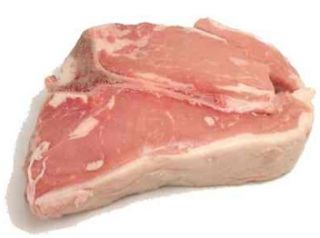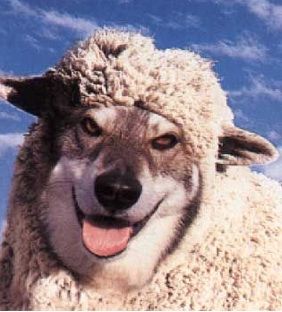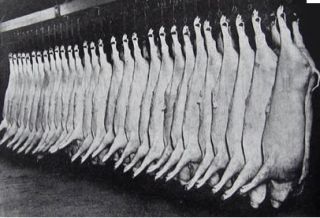
The goal of my previous posts on the Dalai Lama (this, that, and the other) was to understand his unique social status in today’s world. I concluded that the DL is in one sense correct when he refers to himself as an ordinary man, while in another sense he is not because the global adulation he enjoys simultaneously falsifies this assertion. This contradiction brings a tension between creed and deed that one might term hypocritical. I used the ethically fragile issue of the DL’s dietary preferences as one example.
The DL eats meat and, by some reports, he loves it. I pointed out that meat eaters who declare the killing of sentient animals immoral have a problem because they necessarily delegate the killing to others. The Gambini don’t kill, but they have people who get the job done. If a mafia simile seems crass, then what really is the difference, structurally?

As a moral exemplar, the DL has confronted the issue. In his 1990 autobiography (pp. 184-185) we read his account of how he became a carnivore (again). I summarize and quote: He enthusiastically followed a vegetarian regimen in 1966. Few Tibetan dishes are vegetarian, but the cooks experimented with milk and nuts to provide him with protein. He liked these dishes. “I felt really well on them.” Then, “after twenty months I contracted a severe case of jaundice.” Luckily, “eventually the illness, which turned out to be Hepatitis B, cleared up, but not before I had consumed large quantities of Tibetan medicine.” His doctors advised him to cut the grease, milk, and nuts and “to start eating meat again.” So “reluctantly I returned to being non-vegetarian. Today I eat meat except on special occasions required by my spiritual practice.”
Whatever one can conclude from this is unclear. But it is clear what one can NOT conclude. The vegetarian diet did not cause liver disease, and the ingestion of meat did not cure it. If anything, red meat is hard on the liver. Given the DL’s own account, there are no grounds for a myth that he must eat meat or else he would take ill. To say that his doctors advised him to eat meat sounds very much like moral buck-passing, which seems unworthy of a presumed moral exemplar.
A religiously motivated abstention from killing sentient animals, coupled with the facilitation of killing performed by others, reveals a moral double standard. It is on the same page that the DL, without any sign of self-consciousness, provides more evidence for his embarrassingly narrow interpretation of his own moral code. It is worth letting the whole paragraph sink in. Here it is:
“I enjoy watching wildlife even more than gardening. For this purpose, I constructed a bird table just outside my study window. It is surrounded by wired and netting to keep out the larger birds and birds of prey, which tend to scare off their smaller brethren. This is not always sufficient to keep them away, however. Occasionally, I am compelled to take out one of the air guns I acquired shortly after arriving in India, in order to discipline these fat, greedy trespassers. Having spent a great deal of time as a child at the Norbulingka practicing with the Thirteenth’s [Dalai Lama] old air rifle, I am quite a good shot. Of course, I never kill them. My intention is only to inflict a measure of pain in order to teach a lesson.”
This does not fit the image of the DL. Where is the compassion for fellow creatures? Fat, greedy trespassers? Pardonnez moi? He is “compelled” to teach them a lesson. They have it coming. But no, he never kills them. The infliction of pedagogical pain is the aim. And he is such a good shot that he can guarantee pain without risking death or mutilation. Well, then.
The paragraph is as revealing as it is shocking. It’s a veritable assemblage of textbook defenses: arrogance, self-enhancement, blaming of the victim, rationalization. The DL is a very ordinary man indeed.
I am an ordinary man too, and here is my story. When I was about 13, I shot at sparrows with an air gun. My reasoning was exactly like that of his holiness. I considered the sparrows trespassers that were crowding out my good friends, the songbirds. One day, I picked up a small caliber gun to step up the game. No sparrows were around, so I shot at a songbird. I blew it to smithereens. I have not fired a gun since except for paper target practice.
A Talmudic Reading of His Holiness
A commentator asserts that the DL eats meat only when offered, but he would not ask, and that's o.k. with Gautama. Another commentator dissents, asserting that the DL demands meat. The DL himself, in one of his autobiographies, writes that he eats meat to stay healthy (see above), which implies that he will ask for meat if it is not forthcoming. My point about his self-serving attitude stands. Now suppose it were true that he ate meat only when offered. Once fame and status are established along with the understanding that he eats meat, his hosts will offer meat in order to play their role properly, thus giving the DL and his apologists an opportunity to deflect his causal involvement in the killing of sentient animals. It's the hosts, and their henchmen, the butchers, after all, who wring the chickens' necks. Besides, we are led to understand that the DL also consumes meat in his home at Dharmasala. Do his cooks prepare meat for him on their own accord so that he need not ask? What a subtle and duplicitous way of interpreting religious teachings!
The whole business reminds me of the Talmudic prohibition against lighting a fire on the sabbath (for that would be work). The rabbis realized that just asking a gentile to perform the forbidden act would be too easy an out. So they also forbade asking. But people want light and heat and people are clever. So they find ways of asking without asking ('Ooh it's cold here!' 'Gee it's dark in here!') that will be understood as a request. Both parties know the score but each can deny it. It's the beauty of indirect communication. The DL has taken the course.
Dalai’s Dietary Dilemma
It’s been said that while I don’t understand Buddhism, I attack it. The former is true, but the latter is not (yet). Short of offering a full exegesis of Buddhism, some commentators have noted that the Buddha too ate meat. By implication, it’s all right for the DL to do so for he is a monk in the tradition of the Buddha. To my Aristotelian mind, appeals to authority and tradition have little force because they are question-begging. Why is it all right for the Buddha to eat meat when he proscribes killing?

From comments to this blog and websites I consulted, 2 responses emerge. One is that eating meat must be distinguished from the intentional killing of an animal and especially from the killing of an animal for the purpose of feeding you (Buddha, the DL). The other is that your own acts of living (breathing, walking) necessarily kill very small animals. Hence, killing animals cannot be proscribed in toto, but only within boundaries. Setting the boundary between in- and vertebrates might be reasonable, for example. Returning to point 1, however, the Buddha opted for something cleverer. Let others do the killing within the context of their own daily survival routine and let them prepare food for themselves. The monk (Buddha, the DL), who has vowed not to work for a living, subsists on alms instead. Compassionately, he accepts whatever food others might eat themselves and are willing to offer him. This amounts to a complete evisceration (quasi) of any dietary restriction – except for special occasions, which for some spiritual reason require restraint.
Again, Buddha (the DL) can have his carne and eat it too. Now there is a way to make all this coherent, but it requires a class (caste) society. There are masses of meat producers and eaters and a small group that only eats meat. The masses sustain the small group, which makes the latter an elite in the sociological sense. They consume without producing. In the biological sense, they are parasites (take the term in it’s value-free meaning, sensu M. Weber). If the Buddha and his disciples elevate this arrangement to a normative moral level, their morality must be parochial; it cannot extend to the masses. And this seems to be the case. The ethic of compassion is directed from the monk to the farmer. The monk compassionately accepts whatever is offered. The farmer is not asked to compassionately offer only vegetables, knowing that the monk abhors the killing of animals for food. Nor is the farmer asked to compassionately not kill the animal for his own dinner. The parochial Buddhist ethic makes sense only in a caste society. It requires a caste society. Without is, everyone would be a vegetarian or no one would be a Buddhist (monk).
There are two implications. First, whatever the DL has in mind for an independent Tibet, one suspects that elements of class distinction would be preserved. Second, the DL has two ethics: One for himself and other Buddhist monks and another for the rest of the world. One source of the DL’s fame is his advocacy of a global ethic of compassion (a new book on this appeared in 2012). COMPASSION writ large and writ globally should make no room for caste societies or the delegation of killing. Anyone, I propose, who wants to eat a chicken should be prepared to kill it.
It may be objected that referring to Tibetan monks as a spoiled elite is unrealistic. Most monks are mendicants. Perhaps so, but not the DL and his entourage. They do form, as it were, a caste within a caste, living by the monkish ethic, yet living large at the same time.
Other Food for Thought
Unless we accept, without question, the DL’s moral claims, we can try to assess his preferences from the point of view of other schools of thought. Try Kant. His standard of moral behavior is the categorical imperative. Behavior is moral if it could be demanded by law. One can demand respect for property rights, for example, but not theft. Even with Kant, who was ambivalent on the question of free will, one must assume that people have a choice between behavioral alternatives. This choice is critical for the behavior of accepting meat from others to feed oneself. A destitute person must subsist on gifts. His begging is not immoral. Someone who chooses to live on alms must face the question of whether his choice could be the law of the land. Clearly, it cannot. Hence, choosing to beg (or graciously accept gifts in response to implied begging) is not moral by Kant’s lights.
Game theory and economics also provide a point of view. A single beggar does not affect the economy. A caste of beggars might. They cannot claim, without data, that their acceptance of meat gifts has no effect on the production of meat (and the number of sentient animals killed) in society. If their caste is large enough to increase the death toll, they have a moral problem. Conversely, if the cubic tonnage of meat is constant regardless of the number of beggars in society (from zero on up), their consumption of meat necessarily means that they eat meat that would otherwise be eaten by those who produce it or their paying clients. In other words, the mendicant lamas take food out of the mouths of farmers and their children. This would not happen only if there were a surplus of meat, regardless of the existence of a lama caste. But why would it, especially in poor regions?
Lama, D. (1990). Freedom in exile. The autobiography of the Dalai Lama. New York: HarperCollins.




